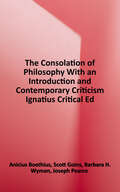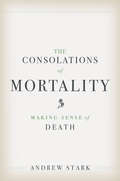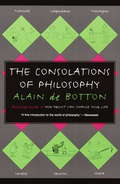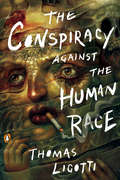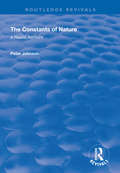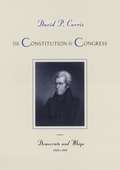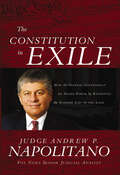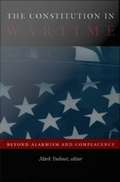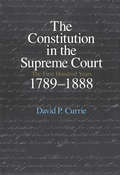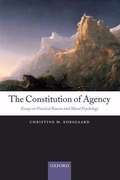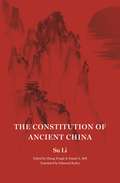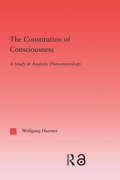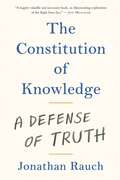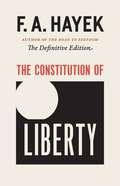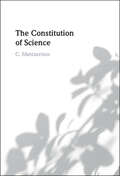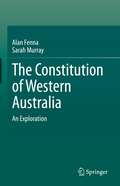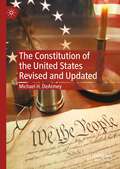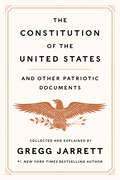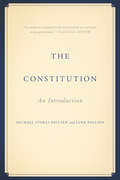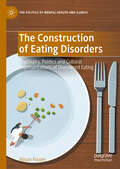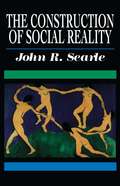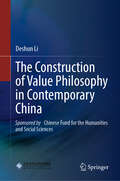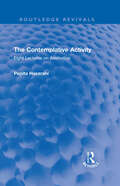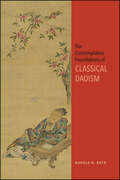- Table View
- List View
The Consolation of Philosophy: With an Introduction and Contemporary Criticism (Ignatius Critical Editions)
by Anicius BoethiusWritten in the sixth century, this book was one of the most popular and influential works of the Middle Ages. Boethius composed the masterpiece while imprisoned and awaiting the death sentence for treason. The Christian author had served as a high-ranking government official before falling out of favor with Roman Emperor Theodoric, an Arian. In The Consolation, Boethius explores the true end of life-knowledge of God-through a conversation with Lady Philosophy. Part prose, part poetry, the work combines Greek philosophy and Christian faith to formulate answers to some of life's most difficult and enduring questions.
The Consolations of Mortality: Making Sense of Death
by Andrew StarkA penetrating and provocative exploration of human mortality, from Epicurus to Joan Didion For those who don't believe in an afterlife, the wisdom of the ages offers four great consolations for mortality: that death is benign and good; that mortal life provides its own kind of immortality; that true immortality would be awful; and that we experience the kinds of losses in life that we will eventually face in death. Can any of these consolations honestly reconcile us to our inevitable demise? In this timely book, Andrew Stark tests the psychological truth of these consolations and searches our collective literary, philosophical, and cultural traditions for answers to the question of how we, in the twenty-first century, might accept our mortal condition. Ranging from Epicurus and Heidegger to bucket lists, the flaming out of rock stars, and the retiring of sports jerseys, Stark's poignant and learned exploration shows how these consolations, taken together, reveal death as a blessing no matter how much we may love life.
The Consolations of Philosophy
by Alain De BottonFrom the internationally heralded author of How Proust Can Change Your Life comes this remarkable new book that presents the wisdom of some of the greatest thinkers of the ages as advice for our day to day struggles. Solace for the broken heart can be found in the words of Schopenhauer. The ancient Greek Epicurus has the wisest, and most affordable, solution to cash flow problems. A remedy for impotence lies in Montaigne. Seneca offers advice upon losing a job. And Nietzsche has shrewd counsel for everything from loneliness to illness. The Consolations of Philosophy is a book as accessibly erudite as it is useful and entertaining.
The Conspiracy against the Human Race: A Contrivance of Horror
by Thomas LigottiIn Thomas Ligotti's first nonfiction outing, an examination of the meaning (or meaninglessness) of life through an insightful, unsparing argument that proves the greatest horrors are not the products of our imagination but instead are found in reality."There is a signature motif discernible in both works of philosophical pessimism and supernatural horror. It may be stated thus: Behind the scenes of life lurks something pernicious that makes a nightmare of our world."His fiction is known to be some of the most terrifying in the genre of supernatural horror, but Thomas Ligotti's first nonfiction book may be even scarier. Drawing on philosophy, literature, neuroscience, and other fields of study, Ligotti takes the penetrating lens of his imagination and turns it on his audience, causing them to grapple with the brutal reality that they are living a meaningless nightmare, and anyone who feels otherwise is simply acting out an optimistic fallacy. At once a guidebook to pessimistic thought and a relentless critique of humanity's employment of self-deception to cope with the pervasive suffering of their existence, The Conspiracy against the Human Race may just convince readers that there is more than a measure of truth in the despairing yet unexpectedly liberating negativity that is widely considered a hallmark of Ligotti's work.
The Constants of Nature: A Realist Account (Routledge Revivals)
by Peter JohnsonFirst published in 1997, this volume constitutes an attempt to resolve certain misunderstandings and ignorance concerning the constants of Nature. Its purpose is to look closely at the philosophical arguments made to support the customary conventional view of measurement, particularly with regard to constants. Peter Johnson argues that historic accounts provide only a partial understanding of the nature of constants, and that the conventionalism that rises relates only to the numerical representations used to quantify the measurement of quantities.
The Constitution in Congress: Democrats and Whigs 1829-1861
by David P. CurrieThe Constitution in Congress series has been called nothing less than a biography of the US Constitution for its in-depth examination of the role that the legislative and executive branches have played in the development of constitutional interpretation. This third volume in the series, the early installments of which dealt with the Federalist and Jeffersonian eras, continues this examination with the Jacksonian revolution of 1829 and subsequent efforts by Democrats to dismantle Henry Clay's celebrated "American System" of nationalist economics. David P. Currie covers the political events of the period leading up to the start of the Civil War, showing how the slavery question, although seldom overtly discussed in the debates included in this volume, underlies the Southern insistence on strict interpretation of federal powers. Like its predecessors, The Constitution in Congress: Democrats and Whigs will be an invaluable reference for legal scholars and constitutional historians alike.
The Constitution in Exile: How the Federal Government Has Seized Power by Rewriting the Supreme Law of the Land
by Andrew P. NapolitanoWhat ever happened to our inalienable rights?The Constitution was once the bedrock of our country, an unpretentious parchment that boldly established the God-given rights and freedoms of America. Today that parchment has been shred to ribbons, explains Fox News senior judicial analyst Judge Andrew P. Napolitano, as the federal government trounces state and individual rights and expands its reach far beyond what the Framers intended.An important follow-up to Judge Napolitano's best-selling Constitutional Chaos, this book shows with no-nonsense clarity how Congress has "purchased" regulations by bribing states and explains how the Supreme Court has devised historically inaccurate, logically inconsistent, and even laughable justifications to approve what Congress has done. It's an exciting excursion into the dark corners of the law, showing how do-gooders, busybodies, and control freaks in government disregard the limitations imposed upon Congress by the Constitution and enact laws, illegal and unnatural, in virtually every area of human endeavor. Praise for The Constitution in Exile from Left, Right, and Center"Does anyone understand the vision of America's founding fathers? The courts and Congress apparently don't have a clue. But Judge Andrew P. Napolitano does, and so will you, if you read The Constitution in Exile."-BILL O'REILLY"Whatever happened to states rights, limited government, and natural law? Judge Napolitano, in his own inimitable style, takes us on a fascinating tour of the destruction of constitutional government. If you want to know how the federal government got so big and fat, read this book. Agree or disagree, this book will make you think."-SEAN HANNITY"In all of the American media, Judge Andrew P. Napolitano is the most persistent, uncompromising guardian of both the letter and the spirit of the Constitution, very much including the Bill of Rights. Increasingly, our Constitution is in clear and present danger. Judge Napolitano--in The Constitution in Exile--has challenged all Americans across party lines to learn the extent of this constitutional crisis." -NAT HENTOFF"Judge Napolitano engages here in what I do every day on my program-make you think. There's no question that potential Supreme Court nominees and what our Constitution says and doesn't say played a major role for many voters in our last couple of elections. What the judge does here is detail why the federal government claims it can regulate as well as tax everything in sight as it grows and grows. Agree or disagree with him-you need to read his latest book, think, and begin to arm yourself as you enter this important debate." -RUSH LIMBAUGH"At a time when we are, in Benjamin Franklin's words, sacrificing essential liberty to purchase a little temporary safety, here comes the judge with what should be mandatory reading for the executive branch cronies who are busy stealing power while they think we're not watching. Thank goodness the judge is watching and speaking truth to power. More than a book, this is an emergency call to philosophical arms, one we must heed before it's too late." -ALAN COLMES
The Constitution in Wartime: Beyond Alarmism and Complacency
by Mark TushnetMost recent discussion of the United States Constitution and war--both the war on terrorism and the war in Iraq--has been dominated by two diametrically opposed views: the alarmism of those who see many current policies as portending gross restrictions on American civil liberties, and the complacency of those who see these same policies as entirely reasonable accommodations to the new realities of national security. Whatever their contributions to the public discussion and policy-making processes, these voices contribute little to an understanding of the real constitutional issues raised by war. Providing the historical and legal context needed to assess competing claims, The Constitution in Wartime identifies and explains the complexities of the important constitutional issues brought to the fore by wartime actions and policies. Twelve prominent legal scholars and political scientists combine broad overviews of U. S. history and contemporary policy with detailed yet accessible analyses of legal issues of pressing concern today. Some of the essays are broad in scope, reflecting on national character, patriotism, and political theory; exploring whether war and republican government are compatible; and considering in what sense we can be said to be in wartime circumstances today. Others are more specific, examining the roles of Congress, the presidency, the courts, and the international legal community. Throughout the collection, balanced, unbiased analysis leads to some surprising conclusions, one of which is that wartime conditions have sometimes increased, rather than curtailed, civil rights and civil liberties. For instance, during the cold war, government officials regarded measures aimed at expanding African Americans' freedom at home as crucial to improving America's image abroad. Contributors. Sotirios Barber, Mark Brandon, James E. Fleming, Mark Graber, Samuel Issacharoff, David Luban, Richard H. Pildes, Eric Posner, Peter Spiro, William Michael Treanor, Mark Tushnet, Adrian Vermeule
The Constitution in the Supreme Court: The First Hundred Years, 1789–1888
by David P. Currie“A thorough, systematic, and careful assessment . . . As a reference work for constitutional teachers, it is a gold mine.” —Charles A. Lofgren, Constitutional CommentaryWinner of the Benchmark Book AwardWinner of the Supreme Court Historical Society Triennial Book PrizeThis acclaimed critical history of Supreme Court decisions, organized around the tenure of specific Chief Justices, evaluates the different styles of constitutional analysis and varying qualities of judicial craftsmanship.“Like the justices he commends, Currie has explained his choices concisely and persuasively, and he has produced a thoughtful synthesis of constitutional law and constitutional history.” —Francis N. Stites, Journal of American History“A splendid overview of a century of constitutional development which combines historical perspective with insightful evaluation of the highest court in the land, sharply illuminating the extent to which that body’s role in our society depends on the character and qualifications of its members.” —Francis H. Heller, American Studies“For anyone who teaches the philosophy of law this is an indispensable volume.” —J. P. Dougherty, Review of Metaphysics
The Constitution of Agency: Essays on Practical Reason and Moral Psychology
by Christine M. KorsgaardChristine M. Korsgaard is one of today's leading moral philosophers: this volume collects ten influential papers by her on practical reason and moral psychology. Korsgaard draws on the work of important figures in the history of philosophy such as Plato, Aristotle, Kant, and Hume, showing howtheir ideas can inform the solution of contemporary and traditional philosophical problems, such as the foundations of morality and practical reason, the nature of agency, and the role of the emotions in action. In Part 1, The Principles of Practical Reason , Korsgaard defends the view that the principles of practical reason are constitutive principles of action. By governing our actions in accordance with Kant's categorical imperative and the principle of instrumental reason, she argues, we take control ofour own movements and so render ourselves active, self-determining beings. She criticizes rival attempts to give a normative foundation to the principles of practical reason, challenges the claims of the principle of maximizing one's own interests to be a rational principle, and argues for some deepcontinuities between Plato's account of the connection between justice and agency and Kant's account of the connection between autonomy and agency. In Part II, Moral Virtue and Moral Psychology , Korsgaard takes up the question of the role of our more passive or receptive faculties - our emotions and responses - in constituting our agency. She sketches a reading of the Nicomachean Ethics , based on the idea that our emotions can serve asperceptions of good and evil, and argues that this view of the emotions is at the root of the apparent differences between Aristotle and Kant's accounts of morality. She argues that in fact, Aristotle and Kant share a distinctive view about the locus of moral value and the nature of human choicethat, among other things, gives them account of what it means to act rationally that is superior to other accounts. In Part III, Other Reflections , Korsgaard takes up question how we come to view one another as moral agents in Hume's philosophy. She examines the possible clash between the agency of the state and that of the individual that led to Kant's paradoxical views about revolution. And finally, shediscusses her methodology in an account of what it means to be a constructivist moral philosopher. The essays are united by an introduction in which Korsgaard explains their connections to each other and to her current work.
The Constitution of Ancient China (The Princeton-China Series)
by Daniel A. Bell Edmund Ryden Su Su Li Zhang YongleHow was the vast ancient Chinese empire brought together and effectively ruled? What are the historical origins of the resilience of contemporary China's political system? In The Constitution of Ancient China, Su Li, China's most influential legal theorist, examines the ways in which a series of fundamental institutions, rather than a supreme legal code upholding the laws of the land, evolved and coalesced into an effective constitution.Arguing that a constitution is an institutional response to a set of issues particular to a specific society, Su Li demonstrates how China unified a vast territory, diverse cultures, and elites from different backgrounds into a whole. He delves into such areas as uniform weights and measurements, the standardization of Chinese characters, and the building of the Great Wall. The book includes commentaries by four leading Chinese scholars in law, philosophy, and intellectual history--Wang Hui, Liu Han, Wu Fei, and Zhao Xiaoli—who share Su Li's ambition to explain the resilience of ancient China's political system but who contend that he overstates functionalist dimensions while downplaying the symbolic. Exploring why China has endured as one political entity for over two thousand years, The Constitution of Ancient China will be essential reading for anyone interested in understanding the institutional legacy of the Chinese empire.
The Constitution of Consciousness: A Study in Analytic Phenomenology
by Wolfgang HuemerThrough the work of philosophers like Sellars, Davidson, and McDowell, the question of how the mind is related to the world has gained new importance in contemporary analytic philosophy. This book demonstrates that Husserl's phenomenological analyses of the structure of consciousness can provide fruitful insights for developing an original approach to these questions.
The Constitution of Knowledge: A Defense of Truth
by Jonathan Rauch“In what could be the timeliest book of the year, Rauch aims to arm his readers to engage with reason in an age of illiberalism.” —Newsweek A New York Times Book Review Editors' Choice Disinformation. Trolling. Conspiracies. Social media pile-ons. Campus intolerance. On the surface, these recent additions to our daily vocabulary appear to have little in common. But together, they are driving an epistemic crisis: a multi-front challenge to America’s ability to distinguish fact from fiction and elevate truth above falsehood. In 2016 Russian trolls and bots nearly drowned the truth in a flood of fake news and conspiracy theories, and Donald Trump and his troll armies continued to do the same. Social media companies struggled to keep up with a flood of falsehoods, and too often didn’t even seem to try. Experts and some public officials began wondering if society was losing its grip on truth itself. Meanwhile, another new phenomenon appeared: “cancel culture.” At the push of a button, those armed with a cellphone could gang up by the thousands on anyone who ran afoul of their sanctimony. In this pathbreaking book, Jonathan Rauch reaches back to the parallel eighteenth-century developments of liberal democracy and science to explain what he calls the “Constitution of Knowledge”—our social system for turning disagreement into truth. By explicating the Constitution of Knowledge and probing the war on reality, Rauch arms defenders of truth with a clearer understanding of what they must protect, why they must do—and how they can do it. His book is a sweeping and readable description of how every American can help defend objective truth and free inquiry from threats as far away as Russia and as close as the cellphone.
The Constitution of Liberty: The Definitive Edition (The\collected Works Of F. A. Hayek Ser. #17)
by F.A. A. Hayek“One of the great political works of our time . . . The twentieth-century successor to John Stuart Mill’s essay ‘On Liberty.’” —NewsweekConservatives and concerned citizens alike have grown increasingly fearful of big government. Enter Nobel Prize–winning economist and political theorist F. A. Hayek, whose passionate warning against empowering states with greater economic control, The Road to Serfdom, became an overnight sensation.The latest entry in the University of Chicago Press’s series of newly edited editions of Hayek’s works, The Constitution of Liberty is, like Serfdom, just as relevant to our present moment. The book is considered Hayek’s classic statement on the ideals of freedom and liberty, ideals that he believes have guided—and must continue to guide—the growth of Western civilization. Here Hayek defends the principles of a free society, casting a skeptical eye on the growth of the welfare state and examining the challenges to freedom posed by an ever expanding government—as well as its corrosive effect on the creation, preservation, and utilization of knowledge. In opposition to those who call for the state to play a greater role in society, Hayek puts forward a nuanced argument for prudence. Guided by this quality, he elegantly demonstrates that a free market system in a democratic polity—under the rule of law and with strong constitutional protections of individual rights—represents the best chance for the continuing existence of liberty.Striking a balance between skepticism and hope, Hayek’s profound insights are timelier and more welcome than ever before. This definitive edition of The Constitution of Liberty will give a new generation the opportunity to learn from his enduring wisdom.
The Constitution of Science
by C. MantzavinosHow can science be protected, by whom and at what level? If science is valued positively as the incubator of the most successful solutions to representational problems of reality as well as the basis of the most effective interventions in the natural and social world, then its constitutional foundations must be protected. This book develops a specific normative outlook on science by introducing the idea of a 'Constitution of Science'. Scientific activities are special kinds of epistemic problem-solving activities unfolding in an institutional context. The scientific enterprise is a social process unfolding within an intricate institutional framework that structures the daily activities of scientists and shapes their outcomes. Those institutions of science which are of the highest generality make up the 'Constitution of Science' and are of fundamental importance for channelling the scientific process effectively.
The Constitution of Western Australia: An Exploration
by Sarah Murray Alan FennaThis book provides the first comprehensive introduction to, and enquiry into, the rules of Western Australia’s (WA) system of government. The WA Constitution is not well known or understood ― or even easy to identify ― and this book provides an essential guide. It brings academic expertise and careful scholarship to the exploration of sometimes complex constitutional issues in a way that will be invaluable for those with specialist interest in constitutional law and government while also being engaging and accessible for a wider audience. In doing so, it combines authorial expertise from constitutional law and political science — something essential to a well-rounded understanding of the simultaneously legal and political nature of a Constitution.
The Constitution of the United States Revised and Updated
by Michael H. DeArmeyAt this moment of extreme political polarization in the U.S. which has the potential to threaten the very foundations of the state, Professor Michael DeArmey proposes a revised and updated Constitution. This enriched, reborn Constitution retains much of the current Constitution but also seeks to meliorate and indeed resolve entirely many of the seemingly intractable problems in American democracy. The rights of American citizens are revisited and expanded, and for the first time a wholly new Bill of Goods sets out government’s role in assisting in the necessities for life. Also new is a Bill of Citizen Duties and Responsibilities. The book contains a careful defense of the proposed changes, including individual chapters focusing on the most controversial topics. Other chapters explore why a constitution is needed and survey the Federalist papers on Constitutional structure. The book also examines the writings of Aristotle, John Adams’ Defence, and the correspondence of Madison and Jefferson.
The Constitution of the United States and Other Patriotic Documents
by Gregg JarrettA collection of some of the most important documents and speeches that have shaped America, with commentary and insights from Fox News star and author of the #1 New York Times bestseller The Russia Hoax, Gregg Jarrett.In this volume, the Constitution and the Declaration of Independence are brought together with dozens of other historic documents and speeches which shaped the destiny of the United States of America. Also included are the Bill of Rights, the Federalist Papers, and the Articles of Confederation. Gregg Jarrett introduces and explains how each of these great documents created the America we know today.In addition to these Founding documents, this deluxe keepsake contains other legendary works from our nation’s history, including Frederick Douglass’s July 4th speech, Abraham Lincoln’s Second Inaugural Address, Martin Luther King Jr.’s “I Have a Dream” speech, and Ronald Reagan’s Berlin Wall speech.A tribute to the great minds and indelible words that have made America great, The Constitution of the United States and Other Patriotic Documents is essential for every patriot and anyone interested in knowing and understanding the course of American history.
The Constitution: An Introduction
by Luke Paulsen Michael PaulsenFrom war powers to health care, freedom of speech to gun ownership, religious liberty to abortion, practically every aspect of American life is shaped by the Constitution. This vital document, along with its history of political and judicial interpretation, governs our individual lives and the life of our nation. Yet most of us know surprisingly little about the Constitution itself, and are woefully unprepared to think for ourselves about recent developments in its long and storied history.The Constitution: An Introduction is the definitive modern primer on the US Constitution. Michael Stokes Paulsen, one of the nation's most provocative and accomplished scholars of the Constitution, and his son Luke Paulsen, a gifted young writer and lay scholar, have combined to write a lively introduction to the supreme law of the United States, covering the Constitution's history and meaning in clear, accessible terms.Beginning with the Constitution's birth in 1787, Paulsen and Paulsen offer a grand tour of its provisions, principles, and interpretation, introducing readers to the characters and controversies that have shaped the Constitution in the 200-plus years since its creation. Along the way, the authors provide correctives to the shallow myths and partial truths that pervade so much popular treatment of the Constitution, from school textbooks to media accounts of today's controversies, and offer powerful insights into the Constitution's true meaning.A lucid and engaging guide, The Constitution: An Introduction provides readers with the tools to think critically and independently about constitutional issues-a skill that is ever more essential to the continued flourishing of American democracy.
The Construction of Eating Disorders: Psychiatry, Politics and Cultural Representations of Disordered Eating (The Politics of Mental Health and Illness)
by Alison FixsenThis book draws on original research to critically examine the social and industrial construction of eating disorders and disordered eating, in an analysis that encompasses psychiatry and health, cultural representations, and the politics of eating disorders. Centrally, it examines the extent to which eating disorders are not ‘made’ by individuals, but rather constructed by groups who claim investment, experience, and expertise in the diagnosis, labeling, treatment, and management of disordered eating. It demonstrates the impacts of biomedical, psychiatric, legal, pharmaceutical, technical and consumer groups, as well as that of the fast-food, fashion, media and social media industries. In doing so, it reveals how they shape the ways that eating disorders are perceived, spoken of, written about, and managed within institutions and wider society. It will appeal to students and scholars of mental health, critical psychology, medical sociology and anthropology and gender studies, and others interested in our future health.
The Construction of Social Reality
by John R. SearleThis short treatise looks at how we construct a social reality from our sense impressions; at how, for example, we construct a 'five-pound note' with all that implies in terms of value and social meaning, from the printed piece of paper we see and touch.
The Construction of Value Philosophy in Contemporary China
by Deshun LiThis book approaches humanism in the new era in China by discussing the nature of value philosophy and by analyzing in depth the significance of value research for China’s modernization and future development. The author expounds his own point of view on the value of human beings as the foundation of value philosophy and subsequently applies it to understanding conflicting values between China and the West, universal values, etc. In addition, he discusses the cultural value concept in China, e.g., the craze for traditional Chinese culture, value choices in socialism with Chinese characteristics, and Deng Xiaoping’s great practice. Combining the fields of academic study, political affairs, cultural communication, and social life, the book offers a valuable resource for scholars, researchers, politicians, diplomats, university students, and those who want to study and understand value philosophy, Chinese value research, and Chinese culture. In addition, it seeks to realize the value of human beings in culture. Lastly, its discussions on the value concept can facilitate understanding and respect among people(s) all over the world.
The Contagion of Violence: 1391 and the Jews of the Spanish Kingdoms
by Michael SchraerThis book explores the causes, progression and consequences of the extraordinary spread of anti-Jewish violence and mass conversion across five separate Spanish polities in 1391, from Seville to the Pyrenees, overwhelming Valencia, Barcelona and numerous other locations. Using comparative analysis with previous outbreaks in Spain and elsewhere, it demonstrates the uniqueness of these events in terms of the speed and extent of transmission of attacks, and their lasting consequences. It argues that models of social contagion best explain this pandemic violence, in which latent hostilities, fears and uncertainties in the post-Black Death world, national and local tensions, were almost spontaneously triggered into often annihilatory riots by rapid communication and movement of people, spreading ideas, news, gossip and rumour through a variety of social networks. It seeks to demonstrate the modes by which polemic and tropes were translated into action, by local preachers, poetry, troubadours and the visual arts.
The Contemplative Activity: Eight Lectures on Aesthetics (Routledge Revivals)
by Pepita HaezrahiFirst published in 1954, The Contemplative Activity analyses our knowledge of aesthetic experience, making the basic assumption that the existence of such experience is a hard core of fact which can only be described. Haezrahi’s approach to the problem of aesthetic judgment is analytical, concerned with clarifying its preconditions, determining its categories and tracing its implications. Her analysis reveals it consists a particular mode of perception and a particular attitude adopted towards what is so perceived. The various philosophies of art and beauty, though they represent attitudes different from the purely aesthetic one, are carefully examined too since the contemplative spectator is indebted to them for the achievement of adequate aesthetic responses to specific works of art. Haezrahi also discusses methods of objective evaluation of the aesthetic experience as well as possible means to reduce the margin of error involved in the particular responses of critics and theorists. This book will be particularly important for students of philosophy and of art.
The Contemplative Foundations of Classical Daoism (SUNY series in Chinese Philosophy and Culture)
by Harold D. RothIn The Contemplative Foundations of Classical Daoism, Harold D. Roth explores the origins and nature of the Daoist tradition, arguing that its creators and innovators were not abstract philosophers but, rather, mystics engaged in self-exploration and self-cultivation, which in turn provided the insights embodied in such famed works as the Daodejing and Zhuangzi. In this compilation of essays and chapters representing nearly thirty years of scholarship, Roth examines the historical and intellectual origins of Daoism and demonstrates how this distinctive philosophy emerged directly from practices that were essentially contemplative in nature.In the first part of the book, Roth applies text-critical methods to derive the hidden contemplative dimensions of classical Daoism. In the second part, he applies a "contemplative hermeneutic" to explore the relationship between contemplative practices and classical Daoist philosophy and, in so doing, brings early Daoist writings into conversation with contemporary contemplative studies. To this he adds an introduction in which he reflects on the arc and influence on the field of early Chinese thought of this rich vein of scholarship and an afterword in which he applies both interpretive methods to the vexing question of the authorship of the Inner Chapters of the Zhuangzi. The Contemplative Foundations of Classical Daoism brings to fruition the cumulative investigations and observations of a leading figure in the emerging field of contemplative studies as they pertain to a core component of early Chinese thought.
